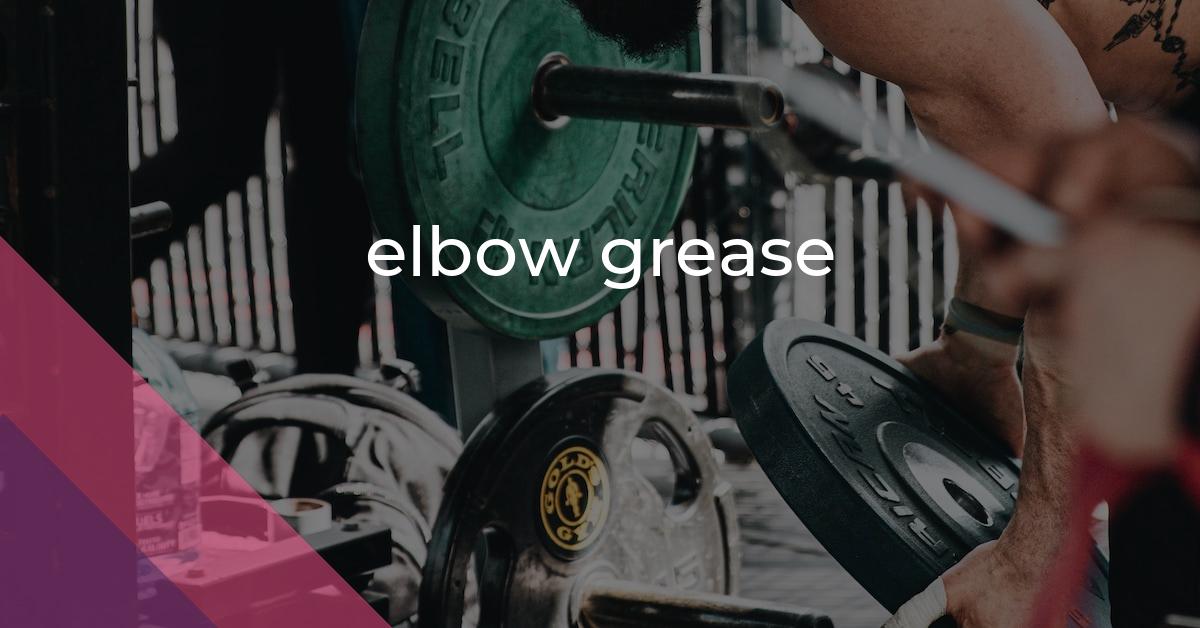elbow grease: Idiom Meaning and Origin
What does ‘elbow grease’ mean?
"Elbow grease" means physical effort or hard work, especially when applied to manual labor or cleaning tasks.

Idiom Explorer
A "labor of love" refers to a task or project done for personal satisfaction or enjoyment rather than for financial or material gain.
The idiom "knuckle down" means to get serious and focused, usually in order to complete a task or achieve a goal. It implies buckling down and applying oneself diligently and determinedly. The idiom is often used to urge someone to start working hard and stop procrastinating.
The idiom "heavy lifting" refers to the difficult or hard work needed to accomplish a task or achieve a goal.
The idiom "grunt work" refers to menial or tedious tasks that require little skill or effort. It is often used to describe work that is necessary but not enjoyable or fulfilling.
The idiom "grunt level" refers to the lowest level or position in a hierarchy or organization. It is often used to describe individuals who perform basic, manual labor or tasks that require little skill or expertise.
A "grease monkey" is a slang term for a mechanic, often used to refer to someone who works on cars or machinery. The term stems from the association of mechanics with getting dirty and using grease while working.
"Go to great lengths" means to put in a lot of effort or take extreme measures to achieve something.
When someone "goes through the motions," they are doing something without enthusiasm or conviction. They are simply going through the required actions without really caring or putting in effort.
The idiom "go the extra mile" means to put in extra effort or go beyond what is expected in order to achieve a goal or provide exceptional service.
"Go the distance" means to complete a task or achieve a goal, even if it requires great effort or perseverance.
Harnessing Elbow Grease: The Key to Success
Elbow grease is an idiom in the English language that represents physical effort or manual labor. It is often used to describe the exertion of one's energy to accomplish a task more efficiently or thoroughly. The phrase has its roots in the concept of using one's own physical strength and effort, specifically by utilizing the muscles in one's arms and the motion of one's elbow.
The origins of the idiom "elbow grease" can be traced back to the early 17th century, although the exact year and circumstances of its first usage remain unclear. However, the phrase gained popularity and became more widely known during the 18th century. It emerged within the context of domestic or household work, where individuals were required to use physical effort to clean or polish a surface, such as wood or metal, to achieve a desired shine or cleanliness.
One plausible explanation for the origins of "elbow grease" comes from the common practice of using various cleaning substances or lubricants, such as oil or grease, in combination with physical effort to accomplish tasks that required more than just ordinary strength. In this context, the phrase symbolizes the additional effort required to achieve a desired result or level of cleanliness beyond what is achieved through minimal exertion.
Over time, the idiom "elbow grease" has become widely known and is often used to emphasize the importance of employing physical effort or hard work to accomplish a task. It is frequently used in situations where a task requires more effort than initially perceived or when one needs to encourage oneself or others to work diligently.
The idiom "elbow grease" is related to several other idioms that also highlight the value of hard work and physical exertion. One of these idioms is "grunt work," which refers to the menial or tedious tasks that require significant effort. Similar to "elbow grease," "grunt work" signifies the importance of dedicating oneself to tasks that may not be glamorous but are necessary for achieving a goal.
Another related idiom is "heavy lifting," which is often used metaphorically to describe the arduous or challenging aspects of a project or endeavor. Just as "elbow grease" emphasizes the physical effort required, "heavy lifting" highlights the significant mental or physical exertion necessary to accomplish a difficult task.
Similarly, the idiom "blood, sweat, and tears" is related to "elbow grease" in its emphasis on the commitment and sacrifice required to achieve success. It serves as a reminder that significant accomplishments often come at a cost, whether it be physical discomfort, emotional strain, or both.
The idiom "by hand" is also related to "elbow grease" as it denotes the manual labor involved in completing a task. "By hand" implies a personalized and meticulous approach that often requires physical effort and attention to detail, aligning with the concept of utilizing one's own strength and motion.
Lastly, the idiom "elbow mentality" can be seen as an extension of "elbow grease." It encompasses the mindset of prioritizing hard work, dedication, and persistence in pursuing a goal. "Elbow mentality" reflects the idea that success is not solely dependent on talent or luck, but rather on the consistent application of effort and determination.
While the idiom "elbow grease" is typically associated with manual labor, it has also evolved to be used metaphorically in a broader sense. It can now refer to any form of mental or physical effort that one dedicates to accomplishing a goal or overcoming a challenge.
Despite being a commonly used idiom, the phrase "elbow grease" maintains its figurative nature and is not meant to be understood literally. It serves as a reminder that significant achievements often require dedicated effort and persistence, even if they do not appear labor-intensive at first glance. Additionally, the idiom offers a subtle reminder of the value of hard work, reinforcing the idea that success is often a result of the energy and time invested in a particular endeavor.
The idiom "elbow grease" captures the essence of the human experience, where the combination of physical and mental exertion is often necessary to navigate life's challenges and achieve personal growth and success. It symbolizes the determination, commitment, and perseverance required to overcome obstacles and accomplish worthwhile goals. As such, it remains a timeless expression, resonating with individuals of different backgrounds, generations, and walks of life, and serving as a testament to the enduring relevance of hard work in the pursuit of excellence.
Example usage
Examples of how the idiom "elbow grease" can be used in a sentence are:
- She polished the silverware with so much elbow grease that it shone like new.
- I'll need to apply some elbow grease to remove the stubborn stain from the carpet.
- If you want to get the grime off these dishes, you'll need to use some elbow grease.
More "Effort" idioms



